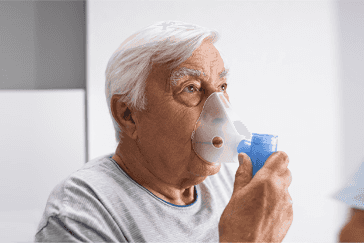
Skilled Nursing, Right at Your Doorstep
Our certified nurses provide professional medical care in the comfort of your home, ensuring you receive hospital-quality treatment without the stress of travel
Comprehensive Care Plans
From post-operative care to chronic condition management, our nursing services are tailored to meet your specific health needs, promoting faster recovery and better outcomes
Trusted Professionals, Compassionate Support
With rigorous training and background checks, our nurses are not only skilled but also empathetic, offering both medical expertise and emotional support
Patient Testimonials
what is lung cancer?
Content is medically reviewed by:
Dr. Udaya Kumar Maiya (MBBS, MD, DNB(RT), DCCF (Paris), Medical Director, Portea.
Lung cancer is one of the leading causes of deaths in the world when compared to prostrate, ovarian, breast, and colon cancers combined. When cells grow abnormally in either of the two lungs or both, they end up creating tumours through the rapid division of lung tissues – the basic lung cancer definition. As these tumours grow bigger and larger in number, they prevent proper functioning of the lungs by undermining its capacity to receive oxygen through the bloodstream.
Advanced lung cancers become inoperable while early lung cancer stages that are localised have a five-year survival rate of roughly 54%. Non-cancerous lung cancers are treatable and not as lethal as their counterpart cancerous cells in patients. Lung cancer symptoms in patients range from chest pain to shortness of breath, wheezing, unexplained weight loss, headaches and bone pain.
types of lung cancer
Lung cancer types are categorised based on the types of cells they originate from. There are mainly two lung cancer types which are Small Cell Lung Cancer (SCLC) and Non-Small Cell Lung Cancer. The distinction between the two is their microscopic and non-microscopic sizes, and each of them is treated in different ways. Here’s what you have to know about them:
- SCLC – This is the type of lung cancer that strongly correlates with cigarette smoking and develops in a rapidly growing fashion compared to other types. They are often discovered too late in their advanced stages in the body.
- NSCLC – 85% of lung cancer cases stem from NSCLC, making it the most common type of lung cancer in the world.
- Bronchial Adenoma – Bronchial adenoma is a rare type of lung cancer, which spreads very slowly throughout the body. It is treatable.
These Might be of Interest
what are some of the lung cancer causes?
Lung cancer affects both those who are exposed to tobacco and secondary smoke. Here are the lung cancer causes in patients:
- Active Smoking – Higher incidences of lung cancers have been reported in those who are chain smokers or take the occasional tobacco directly. Pipe and cigar smoking contribute
towards lung cancer as well. Keep in mind that active smoking is basically indulging yourself in cigarettes and not just being exposed to it. - Passive Smoking – Passive smoking is when the patient concerned doesn’t smoke but is exposed to second-hand smoke. According to clinical estimates, non-smokers have a 24% chance of developing lung cancer when coming into close contact with smokers for a prolonged period.
- Asbestos Fibers – Being exposed to asbestos
fibres in the workplace leads to lung cancer. When exposed to these, they persist in the lungs for a long period. - Radon Gas – Radon gas forms when uranium decays and is a known cause of lung cancer deaths across the world.
- Air Pollution – Smoke from vehicles, emission of fossil fuels and pollutants contaminating the air increases the chances of lung cancer in people.
diagnosis of lung cancer
Lung cancer diagnosis occurs mostly in people of ages 50 and above. If you’ve been smoking since your early years and you’re ordinarily healthy, it’s a good idea to get screened. Your doctor may recommend the following lung cancer tests for identifying the lung cancer types you have:
- Imaging Exams – X-rays and CT scans reveal cancerous
tumours in the lung. Both of them are usually recommended since X-rays don’t detect thetumours properly. - Sputum Cytology – Analyzing sputum samples under a microscope reveals the type of cancerous cells associated with
the lung cancer. - Biopsy – A biopsy procedure may be performed to acquire a sample of the abnormal cells growing in your lungs. Lab analysis of the tissue sample collected through this procedure provides the diagnosis.
lung cancer treatment
Your doctor may recommend lung cancer treatment based on its stage, your health, medical profile and age. Many variables are involved and some patients to choose to avoid treatment and opt for comfort care instead. Either way, these are the following lung cancer treatment options available to patients:
Immunotherapy:
Immunotherapy is an option for those with advanced lung cancer where immune checkpoint inhibitors play a role in attacking cancer cells buy unbinding them from immune system cells.
Radiation Therapy:
Radiation therapy involves using X-rays and proton energy-based beams to eliminate cancer cells from the body. The machine hovers over the body. Radiation therapy may sometimes be combined with chemotherapy is surgery is not an option. This treatment method is used before and after a surgery.
Chemotherapy:
In chemotherapy, doctors prescribe patients drugs to eliminate cancer cells. These may be administered orally or intravenously, and treatment lasts over weeks or months with short breaks in between for recovery. This treatment method is used after surgeries.
Surgery:
A lung cancer surgery will involve removing timorous sections of the lung along with some marginal tissue. There are different types of lung cancer surgery available such as:
- Wedge resection: Removes cancerous tissues of the lung
- Segmental Resection: Removes larger sections of the lungs that are affected by cancer cells but entire lobes aren’t removed
- Lobectomy – The entire lobe of a single lung is removed
- Pneumonectomy – Removes the lung in its entirety
Palliative Care:
Palliative care is basically supportive or comfort care which patients receive after surgery. The doctor works with a patient to reduce signs and lung cancer symptoms to make sure they feel comfortable and supported after the usual treatment.
when do you need us?
If you’re undergoing surgery and seeking palliative care for your rehab, our healthcare professionals will assist you with that by visiting your home. From beginning with breathing exercises, yoga, and mindfulness, our professionals ensure that you receive the physiological and psychological support you need post-surgery. From guiding you through nutrition and physical therapy, we take care of patients by providing lung cancer care at home.
how we can help
Our physiotherapists visit your home to kickstart your lung cancer care. For those who book a consultation, our doctor will visit your home and assess your condition by reviewing your medical history and previous lung cancer treatment reports. Lung cancer care at home or palliative care begins once your reports and condition are reviewed, and nurses for lung cancer care are assigned for ascertained durations to patients.
Summary
Patients with proper lung cancer home treatment have been reported to last up to 3 months longer than those who went without any support.
Lung cancer treatment at home may look bleak for many, but it is important to continue living and not be disheartened in cases where it is incurable. The key point to remember is to keep living and enjoy your last days to the fullest by relieving lung cancer symptoms instead of mourning or grieving since it may help prolong or extend your life.
Also Checkout:
References
Doctor Consultation
Nursing
Physiotherapy
Trained Attendant
Elder Care
Mother & Baby Care
Lab Tests
Medical Equipment
Speciality Pharma
Critical Care








